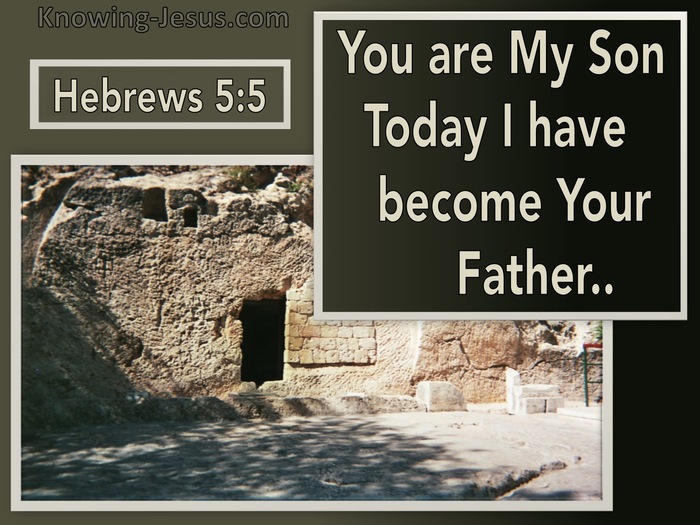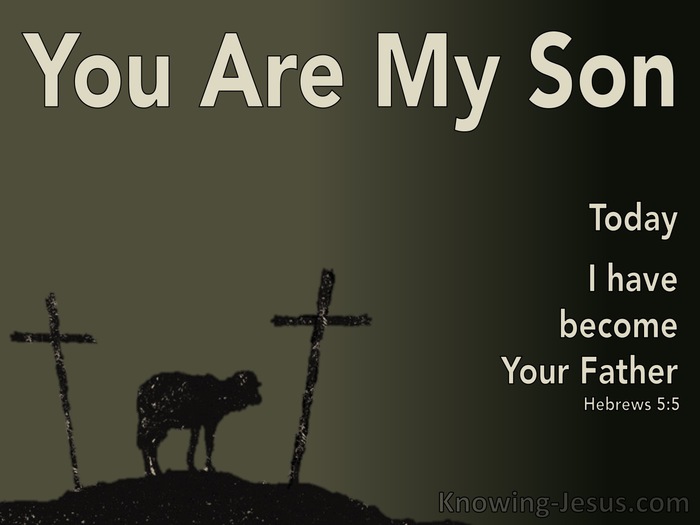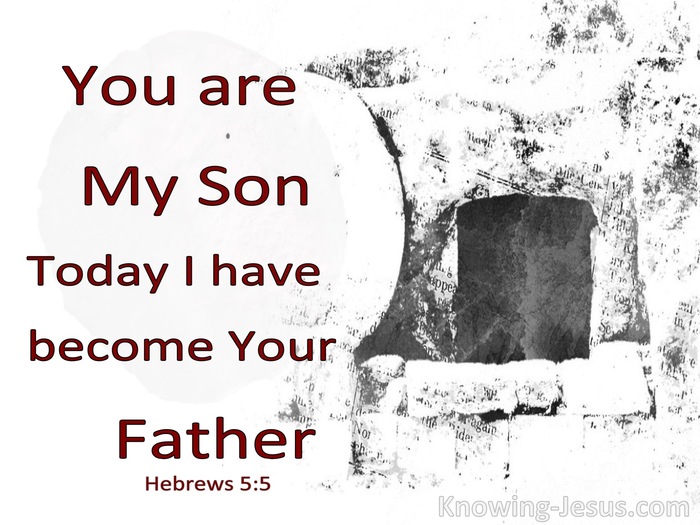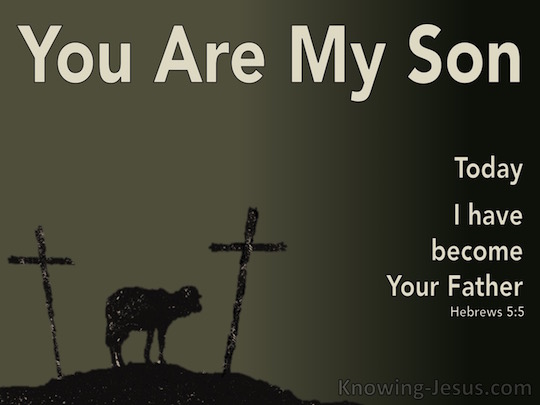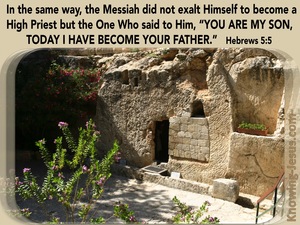Parallel Verses
Darby Translation
Thus the Christ also has not glorified himself to be made a high priest; but he who had said to him, Thou art my Son, I have to-day begotten thee.
New American Standard Bible
So also Christ
“
Today I have begotten You”;
King James Version
So also Christ glorified not himself to be made an high priest; but he that said unto him, Thou art my Son, to day have I begotten thee.
Holman Bible
In the same way, the Messiah did not exalt Himself to become a high priest, but the One who said to Him, You are My Son; today I have become Your Father,
International Standard Version
In the same way, the Messiah did not take upon himself the glory of being a high priest. No, it was God who said to him, "You are my Son. Today I have become your Father."
A Conservative Version
So also Christ did not glorify himself to become a high priest, but it was he who said to him, Thou are my Son, today I have begotten thee.
American Standard Version
So Christ also glorified not himself to be made a high priest, but he that spake unto him, Thou art my Son, This day have I begotten thee:
Amplified
So too Christ did not glorify Himself so as to be made a high priest, but He [was exalted and appointed by the One] who said to Him,
Today I have begotten (fathered) You [declared Your authority and rule over the nations]”;
An Understandable Version
So, Christ also did not take on Himself the honor of becoming head priest, but God said to Him [Psa. 2:7], "You are my Son; today I have conceived you."
Anderson New Testament
So, also, the Christ did not take upon himself the honor of becoming a high priest: but he gave him this honor, who said to him, Thou art my Son, this day have I begotten thee:
Bible in Basic English
In the same way Christ did not take for himself the glory of being made a high priest, but was given it by him who said, You are my Son, this day I have given you being:
Common New Testament
So also Christ did not exalt himself to become a high priest, but it was he who said to him, "You are my son, today I have begotten you";
Daniel Mace New Testament
Wherefore Christ himself did not assume the character of an high priest; but it was confirm'd by him that said, "thou art my son, to-day have I begotten thee."
Godbey New Testament
Likewise Christ also did not glorify himself to become a high priest, but the one having spoken to him, Thou art my Son, this day have I begotten thee:
Goodspeed New Testament
So even Christ did not claim for himself the dignity of the high priesthood, but he was appointed to it by him who said to him, "You are my Son! I have today become your Father!"
John Wesley New Testament
So also Christ glorified not himself to be made an high priest, but he that said to him, Thou art my son, this day have I begotten thee.
Julia Smith Translation
So also Christ honoured not himself, to become chief priest; but he having spoken to him, Thou art my Son, to day have I begotten thee.
King James 2000
So also Christ glorified not himself to be made a high priest; but he that said unto him, You are my Son, today have I begotten you.
Lexham Expanded Bible
Thus also Christ did not glorify himself to become high priest, but the one who said to him, "You are my Son, today I have begotten you,"
Modern King James verseion
So also Christ did not glorify Himself to be made a high priest, but He who said to Him, "You are My Son, today I have begotten You."
Modern Spelling Tyndale-Coverdale
Even so, likewise, Christ glorified not himself, to be made the high priest: but he that said unto him. "Thou art my son, this day begat I thee."
Moffatt New Testament
Similarly Christ was not raised to the glory of the high priesthood by himself but by Him who declared to him, Thou art my son, to-day have I become thy father.
Montgomery New Testament
So even the Christ was not raised to the high glory of the priesthood by himself, but on the contrary by Him who said to him. Thou art my Son; this day have I become thy Father;
NET Bible
So also Christ did not glorify himself in becoming high priest, but the one who glorified him was God, who said to him, "You are my Son! Today I have fathered you,"
New Heart English Bible
So also Christ did not glorify himself to be made a high priest, but it was he who said to him, "You are my Son. Today I have become your father."
Noyes New Testament
Thus Christ did not glorify himself to be made highpriest, but he who said to him, "Thou art my Son, I this day have begotten thee;"
Sawyer New Testament
So also Christ did not put on himself the honor of being made a chief priest, but he that said to him, Thou art my Son, to-day have I begotten thee;
The Emphasized Bible
Thus, also the Christ, glorified not himself to become a high-priest, but he that spake unto him - My Son, art, thou, I, this day, have begotten thee;
Thomas Haweis New Testament
So Christ also did not himself assume the glory to become high-priest, but he [gave it] who spake to him, "Thou art my Son; I have this day begotten thee."
Twentieth Century New Testament
In the same way, even the Christ did not take the honour of the High Priesthood upon himself, but he was appointed by him who said to him-- 'Thou art my Son; this day I have become thy Father';
Webster
So also Christ glorified not himself to be made a high priest; but he that said to him, Thou art my Son, to-day have I begotten thee.
Weymouth New Testament
So Christ also did not claim for Himself the honour of being made High Priest, but was appointed to it by Him who said to Him, "My Son art Thou: I have to-day become Thy Father;"
Williams New Testament
So Christ too did not take upon Himself the glory of being appointed High Priest, but it was God who said: "You are my Son; I have today become your Father,"
World English Bible
So also Christ didn't glorify himself to be made a high priest, but it was he who said to him, "You are my Son. Today I have become your father."
Worrell New Testament
Thus Christ also glorified not Himself to become a high priest, but He Who spake to Him, "Thou art My Son, this day have I begotten Thee";
Worsley New Testament
So also Christ did not glorify himself to be made an high-priest; but He that said unto Him, "Thou art my Son, this day have I begotten thee."
Youngs Literal Translation
so also the Christ did not glorify himself to become chief priest, but He who spake unto him: 'My Son thou art, I to-day have begotten thee;'
Themes
Christ » Divine names ascribed to Christ » Beloved son
Christ » Slandered » Son, beloved
Christ » Priesthood of » Divinely appointed
Christ, the high priest » Appointed and called by God
Divinity » Divine names ascribed to Christ » Beloved son
The high priest » Typified Christ in » Being called of God
Jesus Christ » Priesthood of » Appointed and called by God
Leaders » Dues of » High priests
Obedience » Jesus Christ being obedient
Priesthood » Of Christ » Divinely appointed
Topics
Interlinear
Doxazo
heautou
Ginomai
Archiereus
References
Word Count of 37 Translations in Hebrews 5:5
Prayers for Hebrews 5:5
Verse Info
Context Readings
A High Priest Like Melchizedek
4 And no one takes the honour to himself but as called by God, even as Aaron also. 5 Thus the Christ also has not glorified himself to be made a high priest; but he who had said to him, Thou art my Son, I have to-day begotten thee. 6 Even as also in another place he says, Thou art a priest for ever according to the order of Melchisedec.
Cross References
John 8:54
Jesus answered, If I glorify myself, my glory is nothing: it is my Father who glorifies me, of whom ye say, He is our God.
Psalm 2:7
I will declare the decree: Jehovah hath said unto me, Thou art my Son; I this day have begotten thee.
Hebrews 1:5
For to which of the angels said he ever, Thou art my Son: this day have I begotten thee? and again, I will be to him for father, and he shall be to me for son?
Micah 5:2
(And thou, Bethlehem Ephratah, little to be among the thousands of Judah, out of thee shall he come forth unto me who is to be Ruler in Israel: whose goings forth are from of old, from the days of eternity.)
John 3:16
For God so loved the world, that he gave his only-begotten Son, that whosoever believes on him may not perish, but have life eternal.
John 7:18
He that speaks from himself seeks his own glory; but he that seeks the glory of him that has sent him, he is true, and unrighteousness is not in him.
Acts 13:33
that God has fulfilled this to us their children, having raised up Jesus; as it is also written in the second psalm, Thou art my Son: this day have I begotten thee.
Romans 8:3
For what the law could not do, in that it was weak through the flesh, God, having sent his own Son, in likeness of flesh of sin, and for sin, has condemned sin in the flesh,
Hebrews 1:1
God having spoken in many parts and in many ways formerly to the fathers in the prophets,

